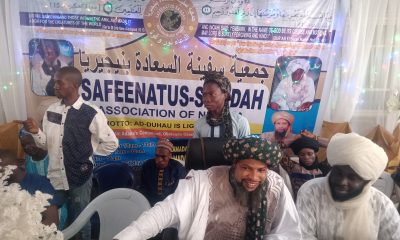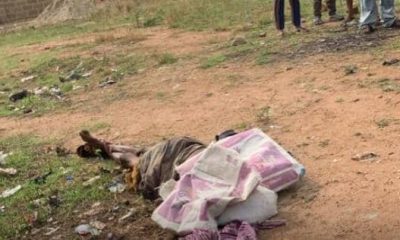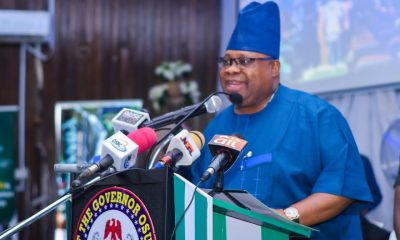News
Tribal Marks On Male Children In Royal Families In Osogbo, Infringement On Human Rights
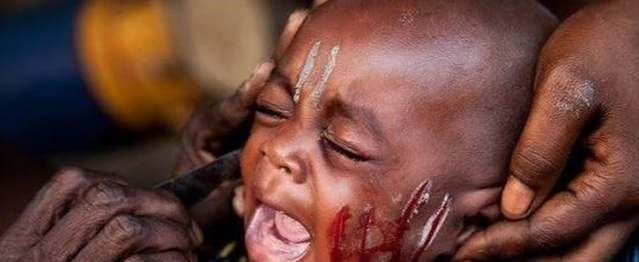
Parents in Osun state, have frowned at the inscription of tribal marks on the faces of male children in some family houses especially the royal families in Osogbo, Capital of Osun State, describing it as archaic, and an infringement on their fundamental human rights.
Tribal marks are usually permanent on the faces of the bearer; it is a way of identification which has been passed down from family, community and royal lineage. It also functions to differentiate one ethnic group from another.
In Osogbo, the Osun state capital for instance, CityMirrorNews findings revealed that tribal marks is one of the criteria or condition which has been passed down from the ancient town and royal families of Oyipiloye, Matanmi, Sogbodede and Laarooye before anyone from the families could become a king.
Of which, it is not everyone that knows this as one of the things the kingmakers do look into consideration before a prince could become a traditional ruler of the town.
This norms of having tribal marks on the faces of male Children or princes to become a king in the encient town of Osogbo as one of the yardsticks are not known to many members of these aforementioned Royal families.
Our findings show that the kingmakers had made it a secret things because of the noises it might be generating puting into consideration the hazardous effects on the bearers.
As a matter of fact, the present Ataoja of Osogbo , Oba Jimoh Olanipekun bears tribal marks. His ancestors it was learnt also bore the tribal marks. Hence ,the reason for making it compulsory for all the male children in Royal families .
A source from one of the royal family in Osogbo who pleaded anonymity said he personally feel bad each time they are giving their children tribal marks saying it’s crazy how those children cry not from just the pain their physical bodies feel, but from the mental scars and fugue nightmares they are about to get, and also the years of questioning the supposed wickedness of their parents who made such cruel choices for them.
The octogenarian made us to understand the fact that the Royal families in Osogbo, Oyipiloye , Matanmi, Sogbodede and Laarooye specialised in giving their male children tribal marks up till now because it’s one of those things they do put into consideration before anybody could be made to ascend the throne of Ataoja of Osogbo land.
He said “this is a way of violating our male Children. It’s not just abuse, the psychological scars and identity crisis they occasion leads to a lifetime of unknown confidence issues, and possibly, anxiety.
“They are simply a contemporary blemish that our male Children will only grow to hate and it doesn’t require deep thought to understand why.
“They probably seized to be fashionable nearly 100 years ago when civilization became a Nigerian staple. What tribal marks are now is unnecessarily violation of children and an unnecessary abuse of the privilege of parenthood.”
Mr John Ekun, a teacher at the Girls High School, Osogbo said that parents inscribed marks on their children during the pre-colonial era for easy identification, adding that tribal marks was used to identify an individual from a certain clan during the war.
Ekun stated that the marks made it easier for people to locate their homes, and communities after being taken away by the colonial masters.
“Those days, parents give tribal marks to their children at the age of nine or ten, and maybe at the age of 24 the person finds his way out of slavery, the only way he could find his way back then, was through the tribal mark.
“The tribal marks were given according to each person’s clan majorly in Kwara, Osun and Oyo states then.
“But we discovered that the issues that brought about tribal marks are no longer there, nobody is doing any slave trading again.
“No need to deface that your innocent child; and that issue also violates human rights, because the time these marks are given to the children, it is without their consent,” he said.
According to him, people that their parents gave tribal marks in the olden days disliked it, but were left with little or nothing much to do.
Another person, Aresa Kehinde, a public servant with tribal marks on his face, said he did not inscribe marks on the faces of his children, adding that it would have amounted to inflicting pain on them.
“I was given tribal marks by my parents, and it was used to differentiate a particular tribe from another.
“As we continue to grow, things changed and tribal marks could be compared to the awkward way of circumcision in the olden days on the male children, but gone are those days.
“You as a parent will even pity the children you give birth to now, and for that you will be so careful not to use a razor or knife to make a mark on them.
“As a young boy, I felt the pain and it will not be right to do so to our children now,” Aresa said.
The method of making these marks is painful. They are made through scarification techniques. People who make these marks usually use razors or sharp objects to make them on children’s faces or other parts of their bodies. Then they rub native dye from charcoal marks to prevent the skin from closing up as the body tries to heal itself. The native dye also helps to stop bleeding.
Nowadays, tribal marks have become the dying lore of ancient days. Some young people who have it feel resentment towards their parents for giving them such scars.
There have been reports of many who resorted to plastic surgery to reduce the effect of the scars or obliterate them.
People have given so many reasons for the eradication of tribal marks in the encient town of Osogbo especially among these Royal families and by extension to some other part of the country and below are some:
[Bullying]
At a tender age, children are confused about so many things and among them is why someone has marks on their faces. We all have been there, giving people nicknames because of the tribal marks on their faces, it may be fun to you but to those involved, it is frustrating. This bullying does not end when they are young, it is a forever thing. The people they want to date often are not interested in dating people with tribal marks and so it continues. They keep suffering for a decision they did not make themselves.
[Risk of infection]
Children are prone to get infected easily. Having marks on their faces makes it easier. The use of unsterilized razors or sharp objects to make them on children’s faces or other parts of their bodies make them open to infections. People who pushed for the eradication of female genital mutilation also pushed for the eradication of tribal marks.
With the increase in the cases of HIV/AIDS and blood -related infections, it is becoming deadly to use sharp objects on people especially as such objects in rural and even urban societies can enhance further transmission of the diseases.
Also, the use of tribal marks as a means of identification and beautification among the Yoruba tribe is no longer a norm and some Yoruba states have enacted certain laws that prohibit the use of the marks.
Violators of the law are liable to fines or imprisonment (or both). In Oyo and Osun States, for example, the prohibition of tribal marks is an integral part of the states Child Rights Law, a law that imposes fine or one-month imprisonment or both for violation.
In these two states ,Osun and Oyo, the state government banned it but people are still doing it also like FGM is banned but peole are still doing it
According to the law “No person shall tattoo or make a skin mark or cause any tattoo or skin mark to be made on a child”.
Different stories have been told by many people with tribal marks and none have been fun so far.
Because of these aforementioned reasons our findings shown that many members of these Royal families in the encient town of Osogbo have to run on exile when it’s almost the time for their wives to be put on bed. It is now rear to see any parents or family no matter how their traditions is to now make tribal marks on their children.
Even those that have the marks already, sees it as wrong thing being done by their parents or family are looking for a means of removing the marks but there is no way they can go about it.
Also, the intervention of the government to stop circumsition had added to it. Recall that the World Health Organization (WHO) and partners are harmonizing efforts by the Nigerian Government to put a stop to the medicalization of Female Genital Mutilation (FGM) saying it is humiliating, excruciating, barbaric and actually poses serious health threats such as tetanus, excessive bleeding, urinary problems and in worst case scenarios, death. “We need to unite and speak in one voice to stop these barbaric acts.”
It’s quite unfortunate that the despite the ordeals bad experience of the people with tribal marks advocacy against the norm has not been extended to this barbaric act by both National and international non Governmental Organization.
Since the people with tribal marks could not have power to reject it when it was about to be done on their bodies because of their tender age, it was done on them without their own consent and giving them blemishes on their bodies, then, it should be considered as an act of infringing one’s right.
There was a case of boy who hails from a royal family in Osogbo, Prince Adewale Motanmi by his name when he walked into the class, the first thing the children noticed was the tribal mark on his face. At first, they ignored him, but later, they asked if his dad has a dog that bit him.
He told them no, that it was just a tribal mark. They pretended they understood but subsequently, once they have any altercation with Prince Motanmi, it is easier to refer to his tribal marks, and he cried each time.
As they grew older, they understood better that Prince Motanmi had no choice but to live with those marks and they tried to be nicer. However, once in a while, they still wondered how someone would think those scars were beautiful.
As this culture persists among the royal families in Osogbo, many deemed it necessary to find their ways and decided to relocate from the family homes with a view to avoiding being circumstanced or getting their male children circumstanced.
-
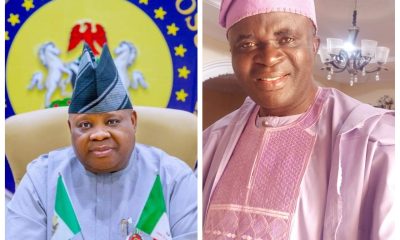
 News4 days ago
News4 days agoBad Roads In Obaagun Township: An S.O.S. to Governor Ademola Adeleke By Dr. Wale Atoba
-

 News3 days ago
News3 days agoWomen Empowerment Takes Center Stage As UACC President, Rev’Owoyemi Declares Open 2024 UACC Women’s Conference In Ibadan
-
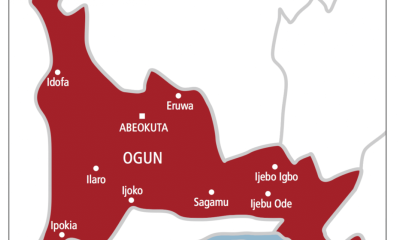
 News4 days ago
News4 days agoCSO Faults FIJ’s Reports On Ibrahim Egungbohun Dende, Says It’s Campaign Of Calumny
-
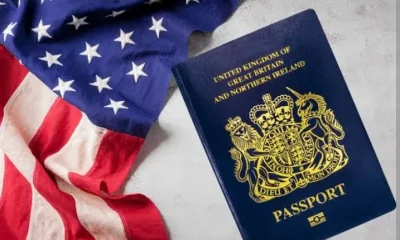
 Foreign News5 days ago
Foreign News5 days agoHow Nigerians Who Want To Japa To UK Can Become British Citizens


